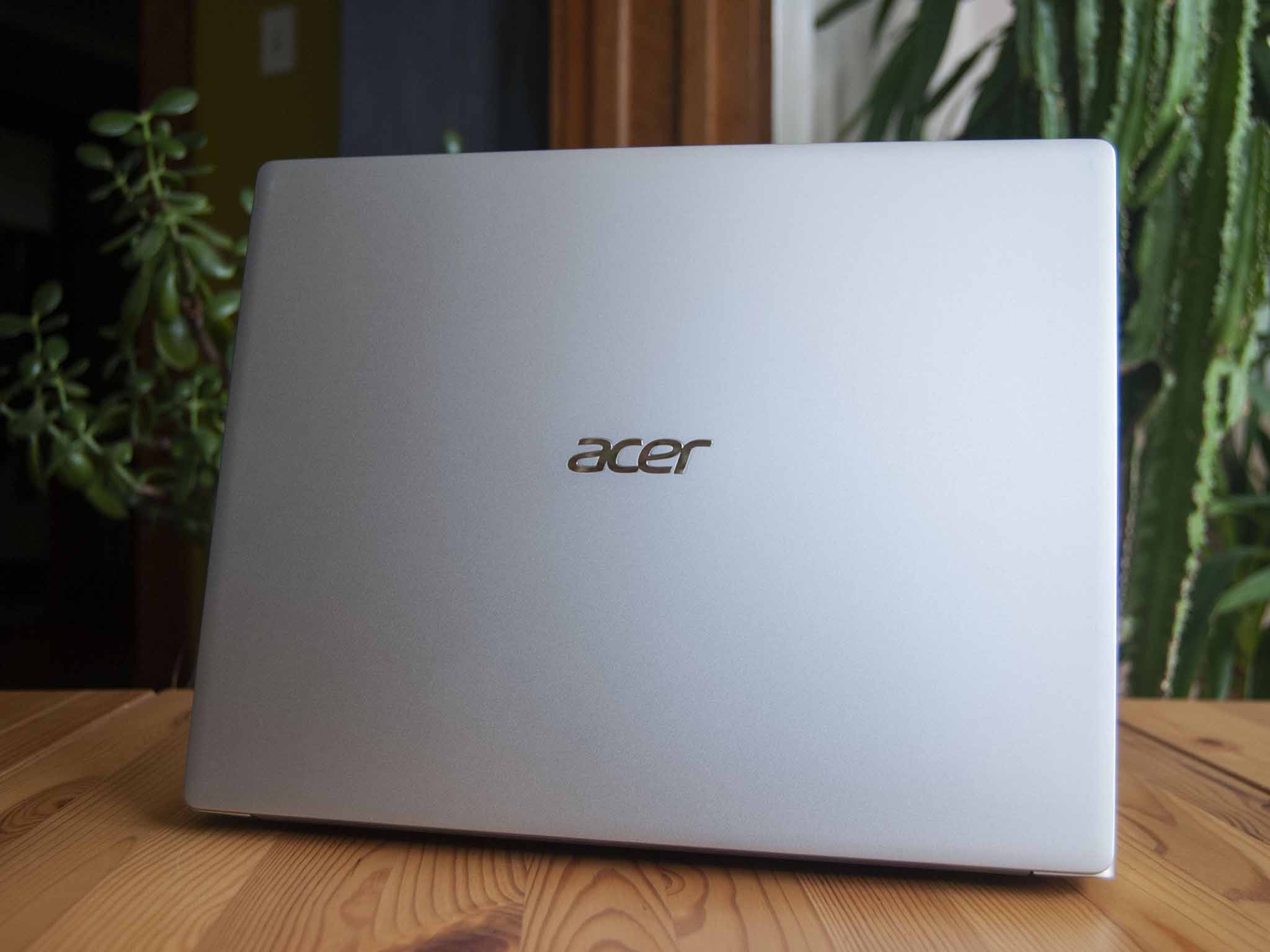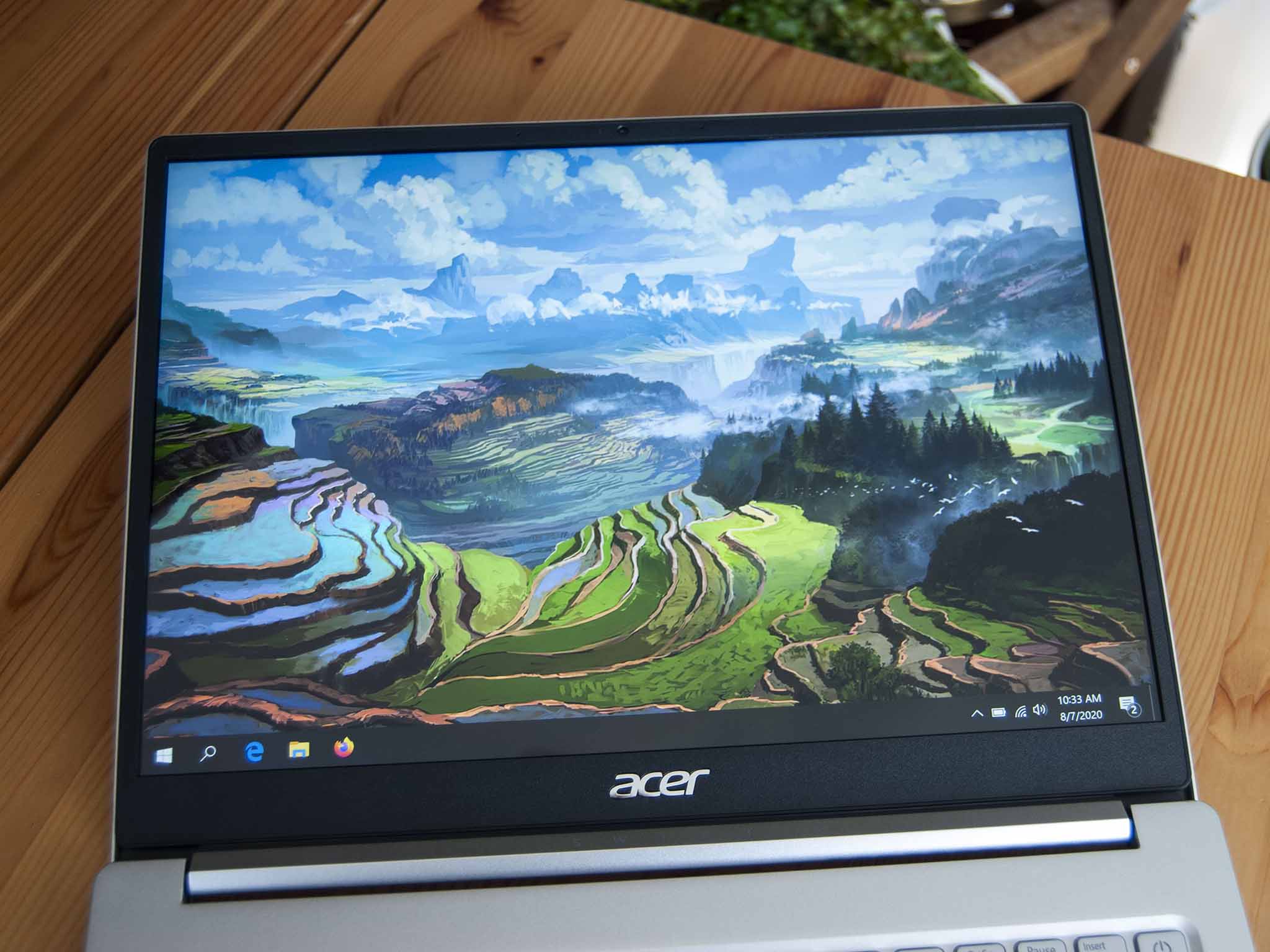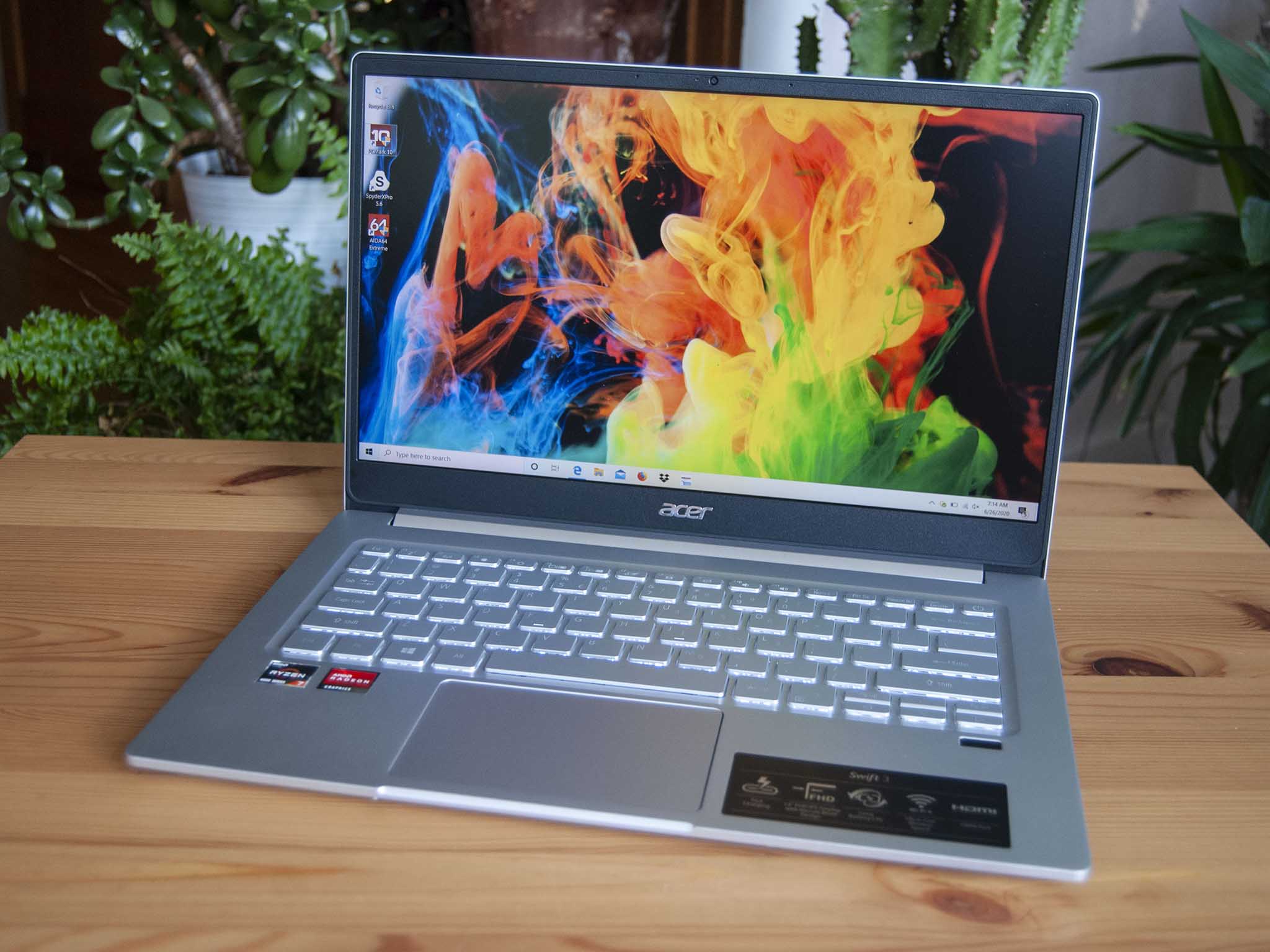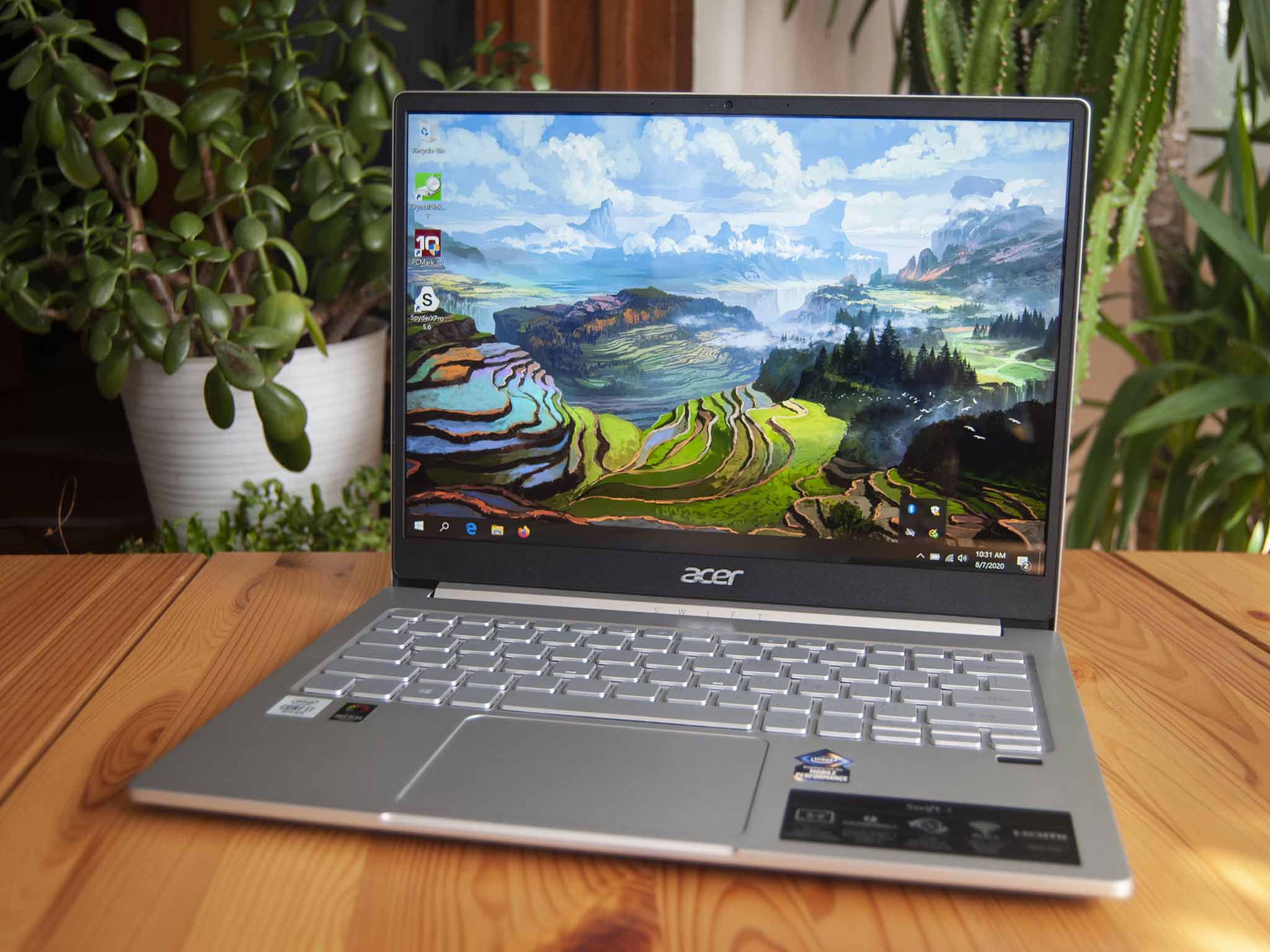
All the latest news, reviews, and guides for Windows and Xbox diehards.
You are now subscribed
Your newsletter sign-up was successful
Acer's refreshed Swift 3, announced at CES 2020, is split into two models. The AMD version (SF314-42), which I already reviewed, has a 14-inch display with standard 16:9 aspect ratio, while the Intel version (SF313-52) that I've been using for the past week has a 13.5-inch display with 3:2 aspect ratio. Aside from performance and some feature differences between Intel and Ryzen, the former laptop has a different design to accommodate the screen size and is part of Intel's "Project Athena" certification that ensures certain measures like long battery life and Instant On. Let's take a look at how it fares in a competitive market and how it stacks up against a bunch of other laptops we've recently reviewed.
The Acer Swift 3 (Intel) is a solid budget laptop, and with Black Friday coming up in the near future you might be able to find a discount. We've seen introductory models go as low as about $770 when not on sale, so be sure you're getting actually getting a good deal when the big sale arrives. The AMD version of the laptop is also generally more affordable, so don't forget to check out both versions of the PC.
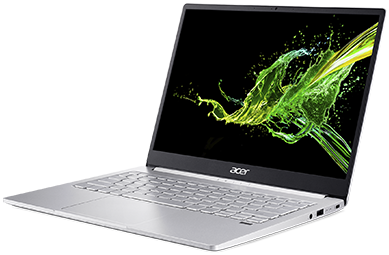
Bottom line: The colorful, bright display with a 3:2 aspect ratio, huge Precision touchpad, battery life, and sturdy build contribute to an overall sound laptop. However, Intel "Ice Lake" performance doesn't measure up to the AMD Ryzen 4000 CPUs found in the other Swift 3 (SF314-42).
Pros
- Excellent battery life and Instant On
- 2K display with 3:2 aspect ratio is superb
- Enormous Precision touchpad
- Thunderbolt 3 and Wi-Fi 6
- Light, sturdy build
Cons
- Glossy display despite no touch
- Some might dislike the keyboard
- Intel "Ice Lake" CPUs outpaced by Ryzen 4000
Acer Swift 3 at a glance
Acer supplied Windows Central with a review unit of the Intel-based Swift 3 (exact serial SF313-52-78W6). Compared to the AMD variant that we also recently reviewed, the Intel version has a display with boxier 3:2 aspect ratio, a larger touchpad, Thunderbolt 3, different overall dimensions, and, of course, some different internal hardware.
This exact review model has inside a 10th Gen Intel Core i7-1065G7 processor (CPU), 16GB of LPDDR4x RAM, a 512GB M.2 PCIe solid-state drive (SSD), and a 13.5-inch non-touch display with a 2256x1504 resolution. The exact configuration is available at Costco for about $1,100. For a better deal, you can get an otherwise similar laptop with an upgraded 1TB SSD for about $1,066. That's considerably more than the AMD version that we reviewed with Ryzen 7 4700U CPU, 8GB of RAM, 512GB SSD, and 1080p display with 16:9 aspect ratio, which costs about $680.
A lower-end version of the Intel model, complete with 10th Gen Core i5-1035G4 CPU, 8GB of RAM, 512GB M.2 PCIe SSD, and 2256x1504 resolution display costs closer to about $800.
Here's a closer look at what makes up the review model of the Acer Swift 3 (SF313-52-78W6).
| Category | Spec |
|---|---|
| OS | Windows 10 Home |
| Processor | 10th Gen Intel Core i7-1065G7 Four cores 1.30GHz base clock 3.90GHz boost clock |
| RAM | 16GB LPDDR4x Dual-channel |
| Graphics | Intel Iris Plus |
| Storage | 512GB M.2 PCIe SSD Kingston |
| Display | 13.5 inches 2256x1504 3:2 aspect ratio Non-touch, glossy IPS |
| Ports | Thunderbolt 3 USB-A 2.0 USB-A 3.1 (Gen 1) HDMI 3.5mm audio |
| Audio | Dual Stereo speakers Down-firing Acer TrueHarmony |
| Wireless | Intel Wi-Fi 6 AX201 802.11ax (2 x 2) Bluetooth 5.0 |
| Camera | Front-facing 720p |
| Security | Fingerprint reader Kensington lock slot |
| Battery | 56Wh 65W AC adapter |
| Dimensions | 11.9 x 9.2 x 0.63 inches (302.26mm x 233.68mm x 16mm) |
| Weight | 2.65 pounds (1.2kg) |
Thunderbolt 3 and Wi-Fi 6
All the latest news, reviews, and guides for Windows and Xbox diehards.
Acer Swift 3 design and features
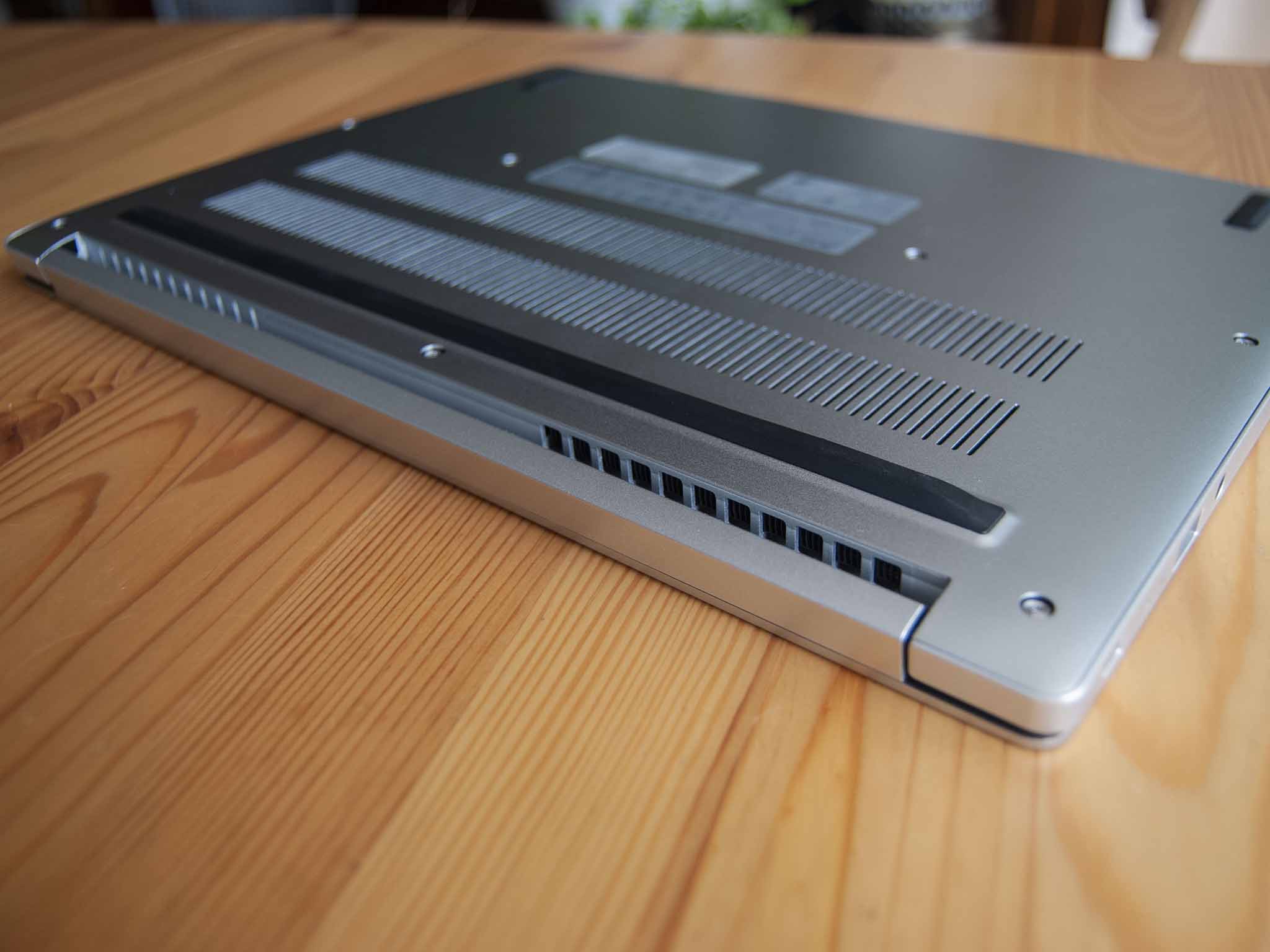
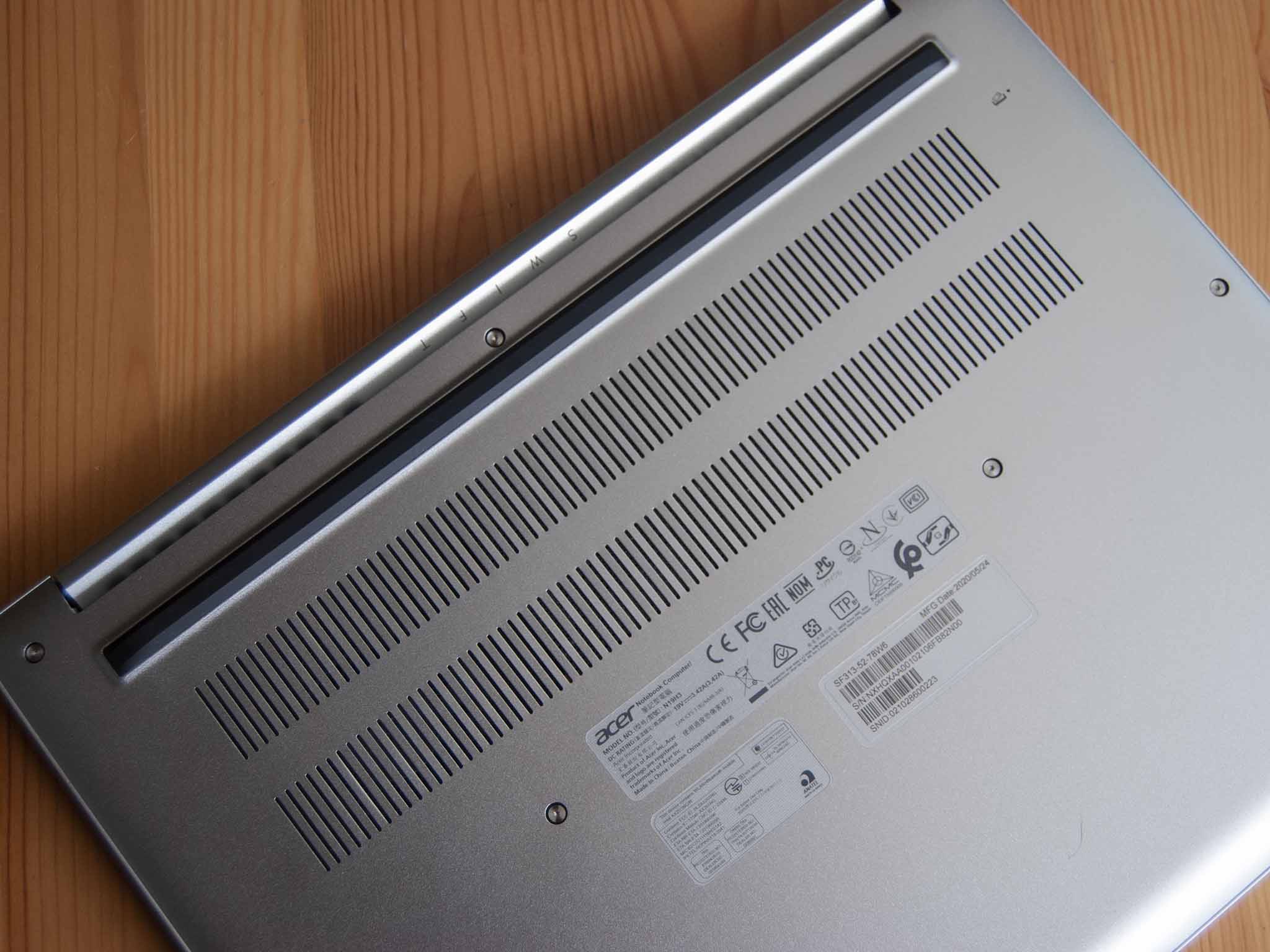
The Intel version of the Swift 3 has different dimensions than the AMD version, mostly due to the taller display with 3:2 aspect ratio. It's deeper at 9.2 inches (233.68mm) compared to 8.6 inches (218.4mm), but it's also not as wide at 11.9 inches (302.25mm) compared to 12.7 inches (322.6mm). As for thickness, the Intel Swift 3 wins: it measures 0.63 inches (16mm) compared to 0.71 inches (18mm). Weight is the same on both laptops.
The magnesium alloy chassis helps keep weight down, and there's really not much flex at all in the main chassis. The lid with plastic bezel around the display flexes a bit more, but nothing out of the ordinary. The same single wide hinge with Swift stamped in the middle allows the screen to sit back a full 180 degrees. Inside the hinge well are two exhaust vents, though one is not in operation. The bottom of the laptop has double intake vents that run almost from side to side.
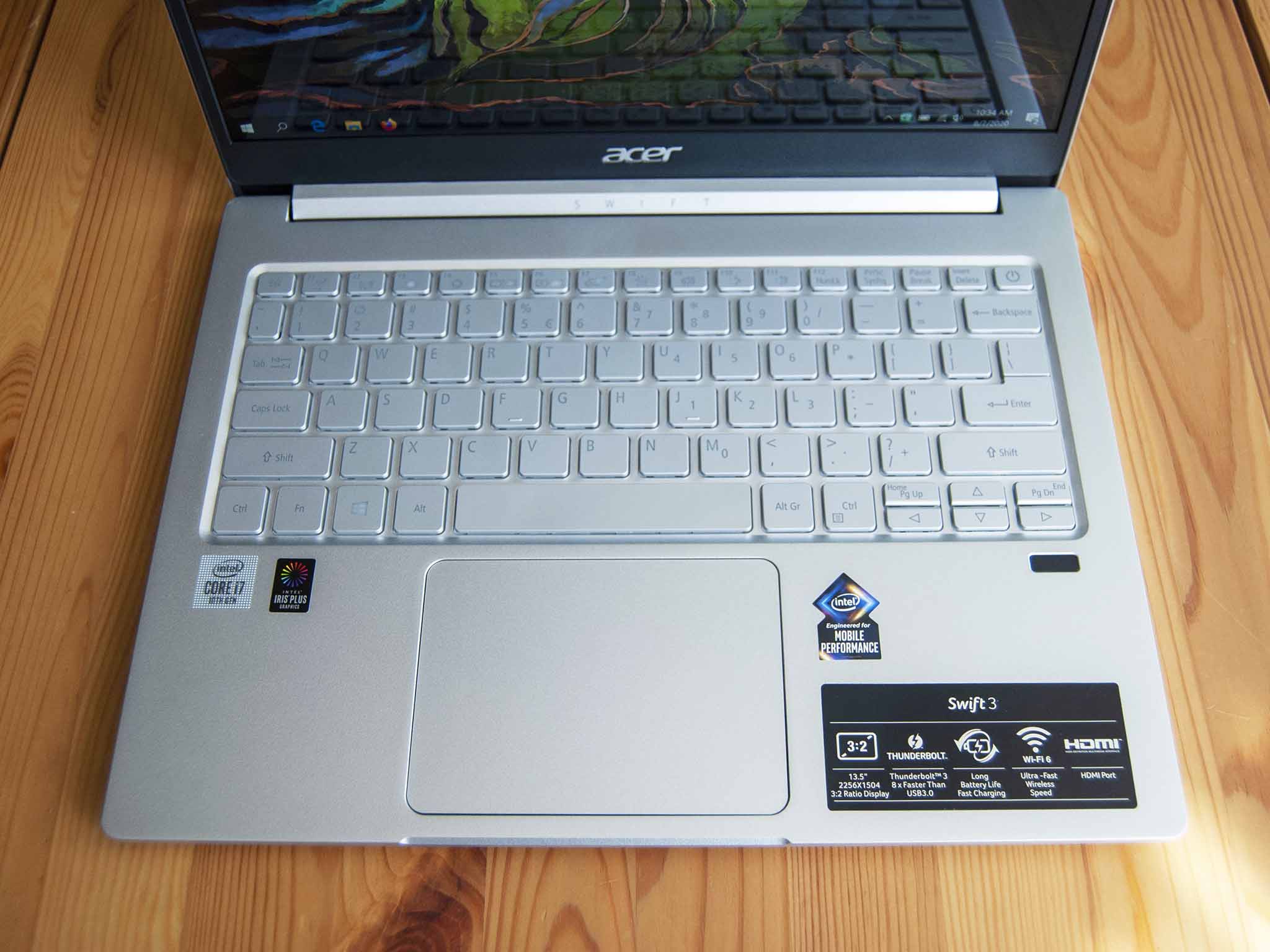
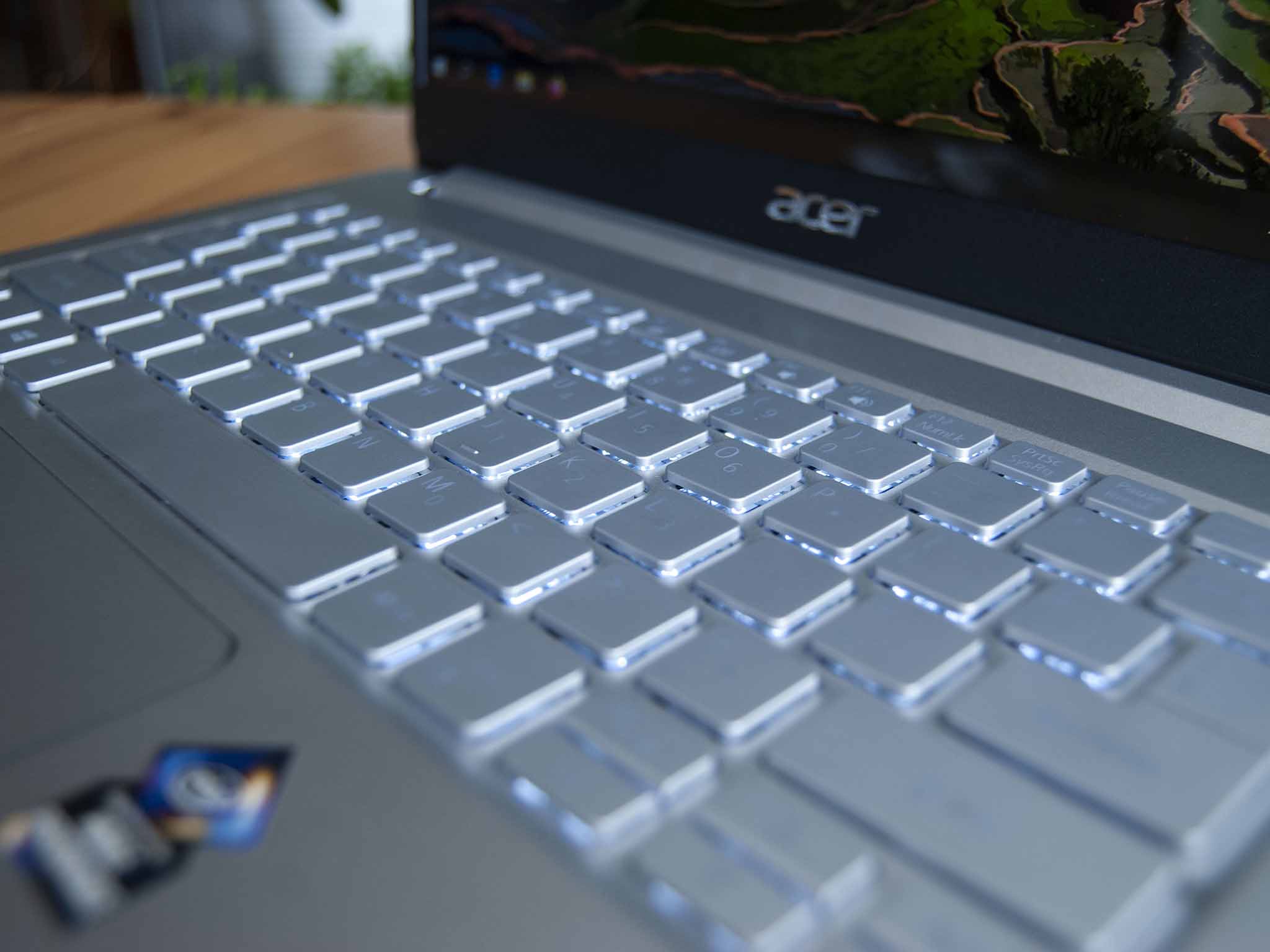
Due to the narrower build, the keyboard — which is set down into the chassis — gets closer to stretching from edge to edge. Its keys have deep travel and a soft landing, allowing for comfortable typing. However, it's using the small chiclet shape that's starting to look a bit outdated. I found typing to be mostly pleasant; just expect a bit of a transition coming from a keyboard with larger keys. It's mostly notable on the Shift, Enter, Tab, and Backspace keys. One other small annoyance is the white backlight with silver finish. Unless you're working in a truly dark situation, the light obfuscates the lettering on the keys.
Thanks to a deeper body, the Precision touchpad has been blown up to a relatively huge size. It's smooth, it tracks well, and though the click is a bit clunky it helps contribute to an overall satisfying experience for anyone who focuses on daily productivity work. Students, home office workers, or just casual users shouldn't mind what the Swift 3 has to offer in terms of input.
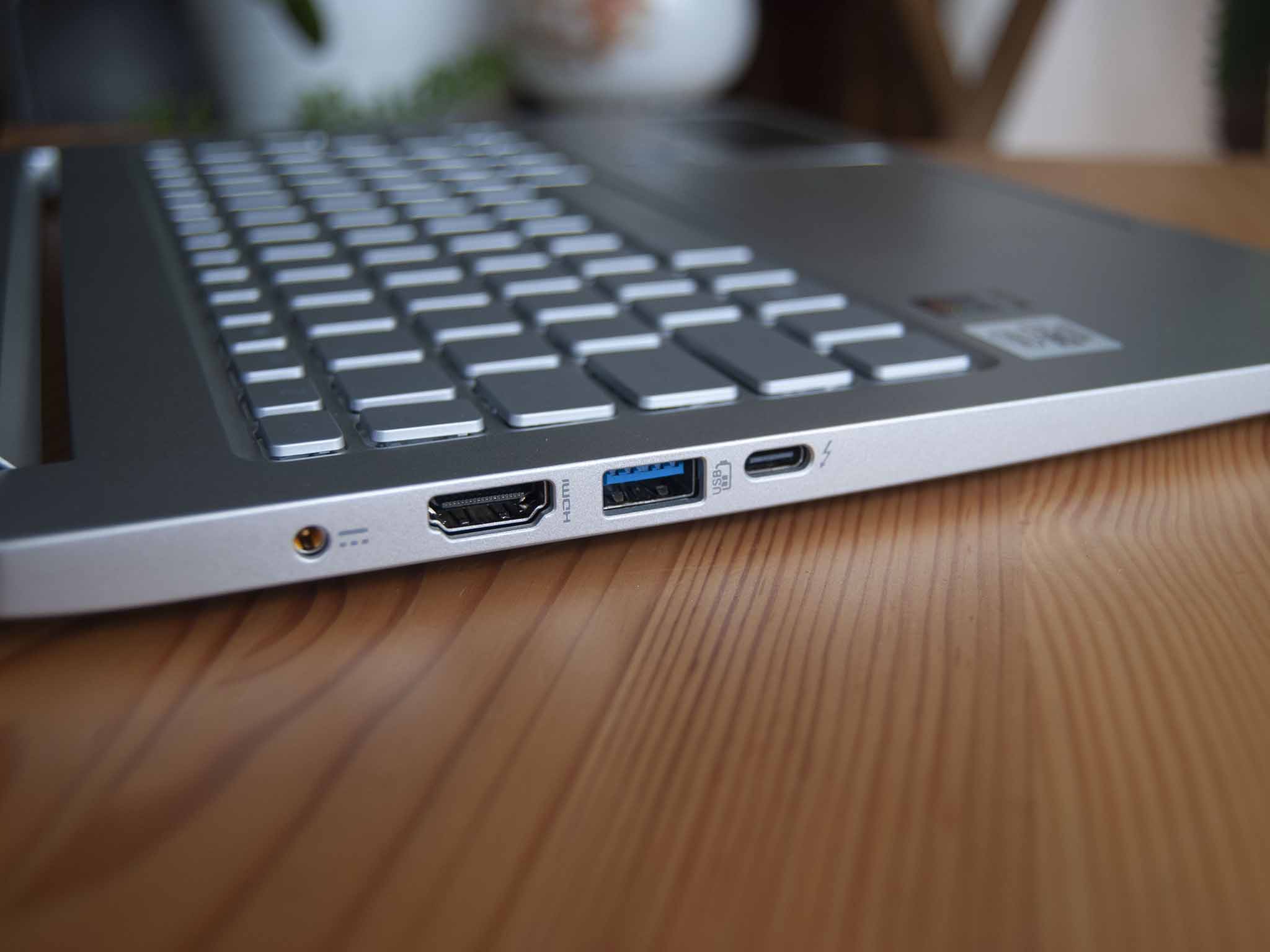
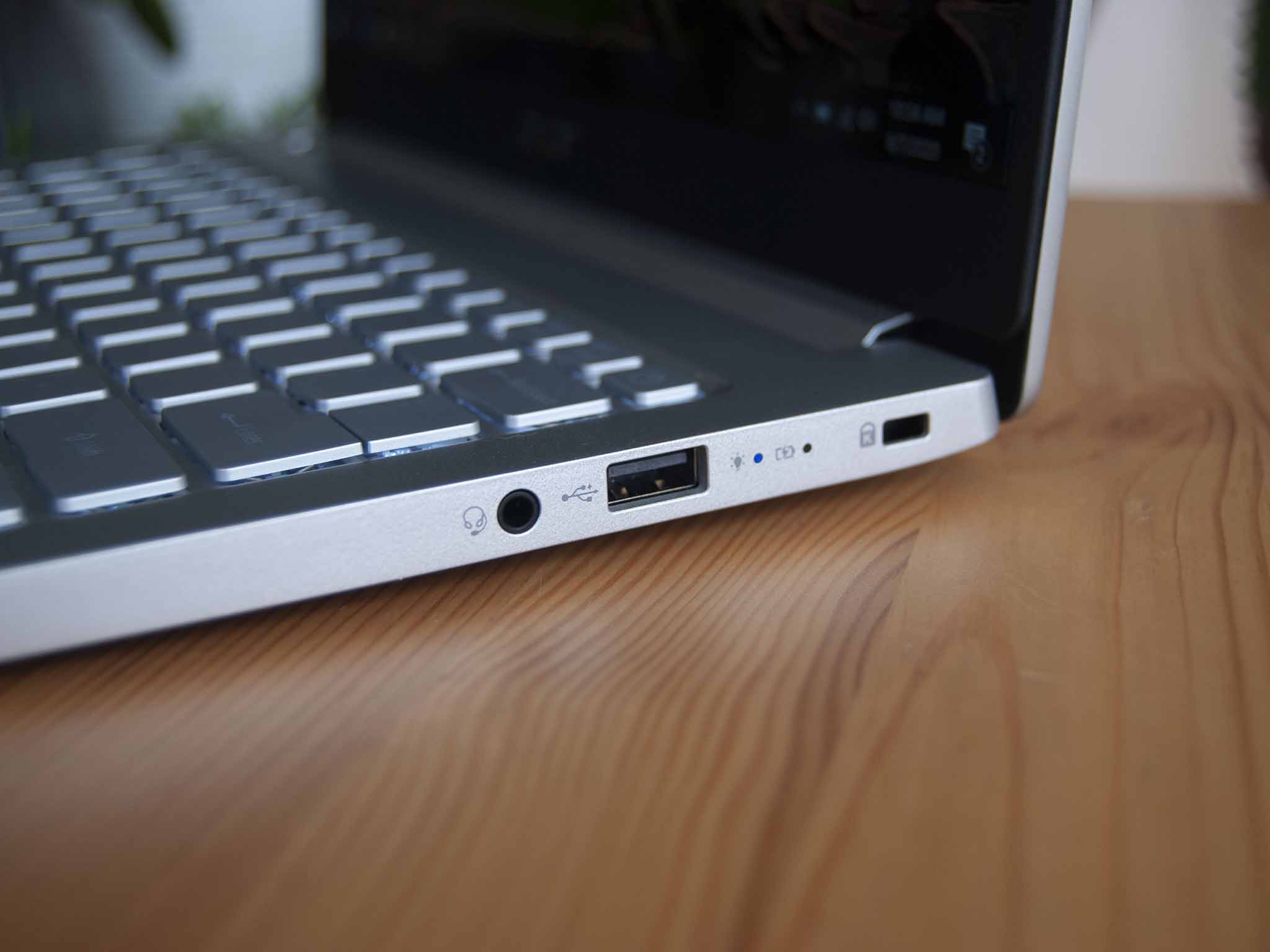
Ports are the same here as on the AMD Swift 3, save for the USB-C port being upgraded to Thunderbolt 3 for more powerful docking station options. The right side of the laptop includes USB-A 2.0, a 3.5mm audio jack, and a Kensington lock slot, while the left side has the Thunderbolt 3, USB-A 3.1, HDMI, and a small barrel charging port. The laptop can also be charged with the Thunderbolt 3 port for extra convenience, though it comes with an AC adapter with barrel end. Along with the Kensington lock slot, a fingerprint reader adds to security. It works with Windows Hello for quick, convenient logins, and I had no issues using it.
Above the display is a 720p webcam. Nothing special here, but it will get the job done if you're video conferencing. A third-party webcam is always an alternative if you need a high-end camera. Dual down-firing speakers are located along the wedged front underside of the laptop. They don't get particularly loud, but they do offer clear audio. Bass could be better. An Intel AX201 wireless chip is included for speedy Wi-Fi 6 internet.
3:2 aspect ratio
Acer Swift 3 display
Perhaps the biggest and best difference between the two Swift 3 laptops is the Intel version's 3:2 aspect ratio and boosted resolution. It's technically sized a bit smaller at 13.5 inches (compared to 14 inches), but it's taller to display more content. That's an 83.65% screen-to-body ratio, with relatively slim bezel along the top and sides. It's not going to contend with a premium device like the XPS 13 9300 in terms of razor-thin bezel, but what it has doesn't make the laptop look cheap.
The Swift 3's 3:2 display could belong to a much pricier laptop. Color, brightness, and contrast are all positives.
The different aspect ratio calls for a non-standard 2256x1504 resolution, which Acer is calling 2K. It provides a noticeably clearer picture compared to 1080p, and its color and brightness are both also much better than in the AMD version. Measuring with a DataColor SpyderX Pro colorimeter, I got back 100% sRGB, 78% AdobeRGB, and 81% DCI-P3. The display also managed to hit 457.8 nits brightness. That's downplayed a bit due to the glossy display -- matte would be better, especially since there's no touch function -- but it's still bright enough to handle most scenarios unless you're working outdoors or in direct sunlight.
Overall this is a big step up for the Swift 3, and it's a shame this display wasn't used for the AMD version as well. The color, contrast, brightness, and aspect ratio with AMD Ryzen's performance would make for a very enticing laptop.
Exceptional battery life
Acer Swift 3 performance and battery
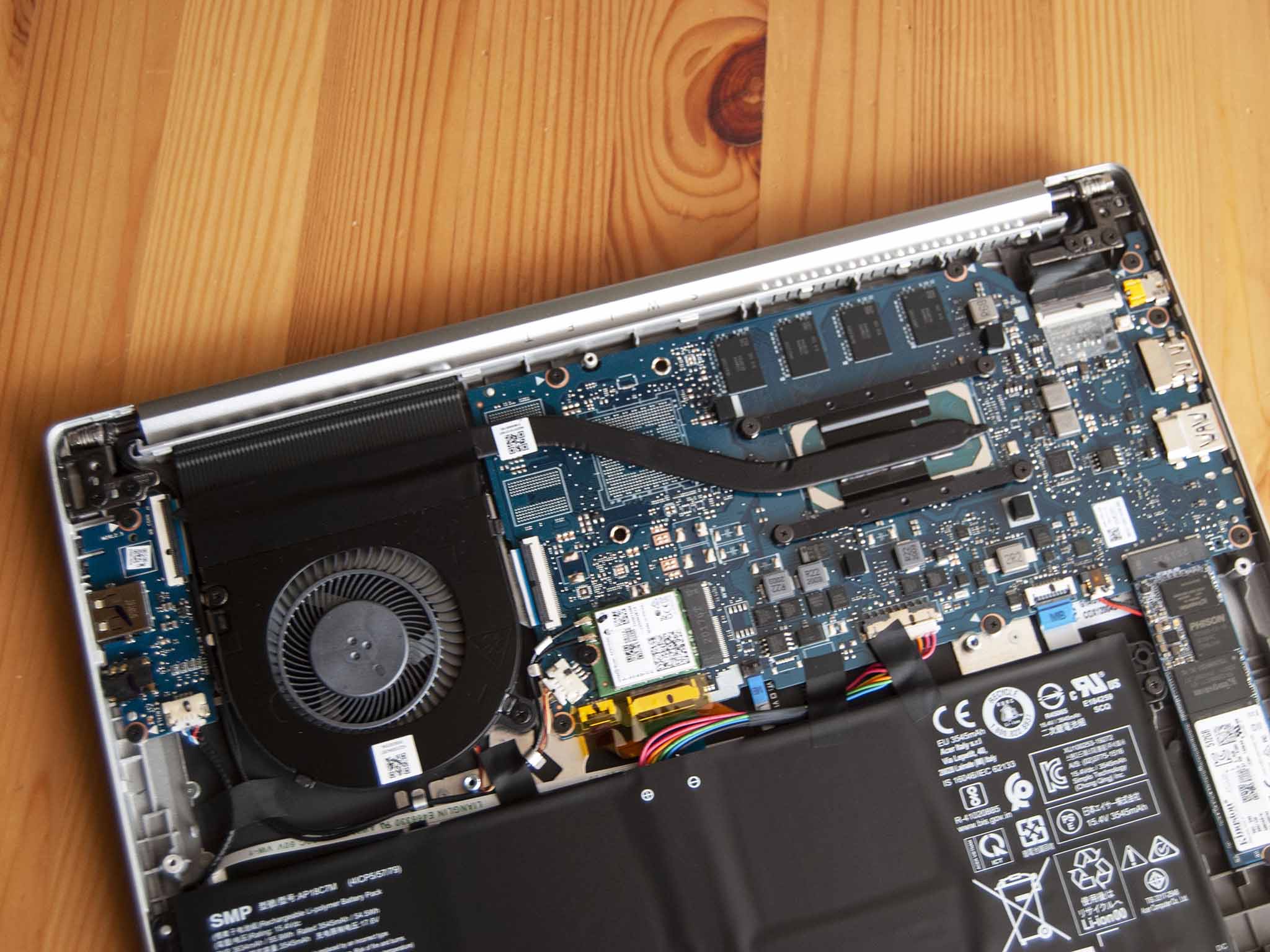
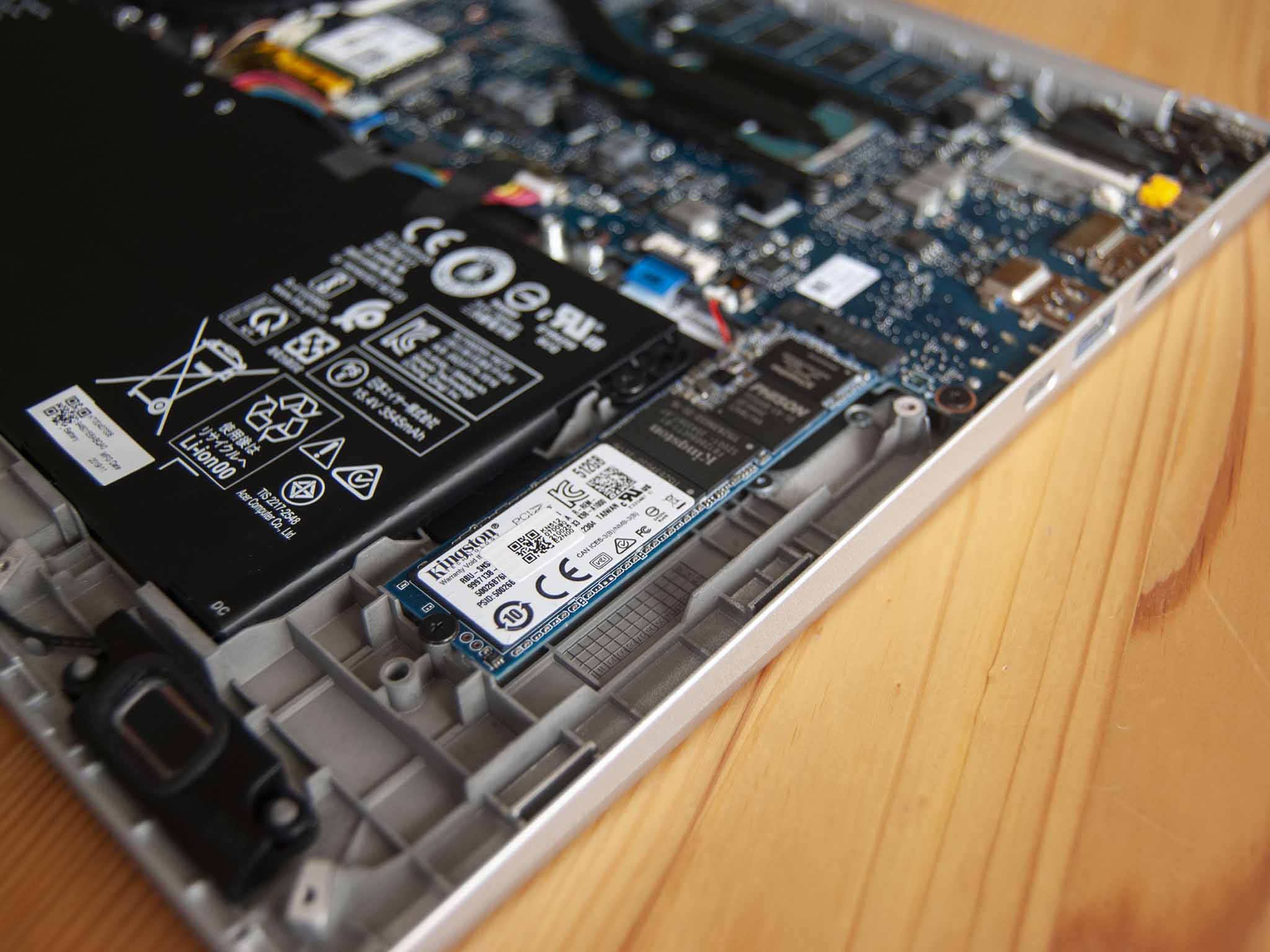
Testing battery life with PCMark 10's Modern Office rundown, I set screen brightness to 50% and the Windows 10 power mode to "Better Performance." The screen is bright enough at this point to combat most glare (unless you're outdoors or in direct light). The Swift 3 hit 12 hours and 12 minutes in this test, which is quite impressive. Using the laptop regularly, I was able to get through a full workday without needing a recharge. Fast recharge is also available, allowing you to get most of a charge in less than an hour.
The Swift 3's long battery life allows you to leave the charger behind.
This excellent battery life is part of Intel's Project Athena certification. The laptop also includes nifty features like Wake on Voice (through Cortana) and Instant On. Indeed, opening the lid on this laptop has the login screen ready to go immediately.
Performance all feels snappy, and with the Core i7 CPU and 16GB of RAM, I was able to handle a daily workload, including word processing, heavy web browsing, editing with Photoshop, and multiple messaging apps. A Core i5 CPU with 8GB of RAM will be less cut out for light specialized work like editing, but it'll still handle everything else.
I ran some synthetic benchmarks to see how the laptop measures up against other hardware we've recently reviewed.
Geekbench 5
Geekbench 5.0 (CPU) (Higher is better)
| Device | CPU | Single core | Multi core |
|---|---|---|---|
| Acer Swift 3 (Intel) | i7-1065G7 | 1,302 | 3,891 |
| Acer Swift 3 (AMD) | Ryzen 7 4700U | 1,131 | 4,860 |
| Acer Spin 3 (SP314-54N) | i5-1035G1 | 1,185 | 3,524 |
| HP ENVY x360 | Ryzen 5 4500U | 1,100 | 4,564 |
| Lenovo IdeaPad Flex 5 14 | Ryzen 5 4500U | 1,087 | 4,570 |
| Surface Laptop 3 15 | Ryzen 5 3580U | 769 | 2,720 |
| Lenovo ThinkPad L13 Yoga | i5-10210U | 1,069 | 3,754 |
| Lenovo Yoga C640 | i3-10110U | 1,015 | 2,111 |
| Lenovo Yoga C740 14 | i5-10210U | 1,094 | 3,767 |
| Samsung Galaxy Book Flex | i7-1065G7 | 1,317 | 4,780 |
| Dell XPS 13 (9300) | i7-1065G7 | 1,284 | 4,848 |
| Surface Laptop 3 15 | i7-1065G7 | 1,336 | 4,893 |
| HP Elite Dragonfly | i7-8665U | 1,125 | 2,942 |
| Surface Laptop 3 13.5 | i5-1035G7 | 1,177 | 4,413 |
| HP Spectre x360 13 | i7-1065G7 | 1,006 | 3,402 |
| Surface Pro X | SQ1 | 725 | 2,819 |
| Galaxy Book S | SD 8cx | 685 | 2,681 |
Intel's CPUs deliver strong single-core performance compared to AMD Ryzen, though multi-core scores generally don't match up due to fewer cores. Even then, the Core i7-1065G7 in the Swift 3 tested low in the multi-core Geekbench 5 benchmark, somewhere closer to a Core i5. I also used the OpenCL benchmark to test integrated graphics performance. Intel Iris Plus scored 4,598, whereas Vega 7 integrated graphics with the Ryzen 7 CPU scored 12,008 on the same test.
PCMark
PCMark 10
| Device | Score |
|---|---|
| Acer Swift 3 (Intel) | 4,135 |
| Acer Swift 3 (AMD) | 4,861 |
| Acer Spin 3 (SP314-54N) | 3,674 |
| HP ENVY x360 | 4,755 |
| Lenovo IdeaPad Flex 5 14 | 4,759 |
| Surface Laptop 3 15 (AMD) | 4,006 |
| Lenovo IdeaPad Flex 14 | 3,202 |
| Surface Book 3 15 | 4,393 |
| Lenovo ThinkPad L13 Yoga | 4,899 |
| Lenovo Yoga C640 | 4,008 |
| Lenovo Yoga C740 | 4,941 |
| Samsung Galaxy Book Flex | 3,924 |
| Dell XPS 13 (9300) | 4,524 |
| Surface Laptop 3 15 (Intel) | 4,604 |
| Dell XPS 13 2-in-1 | 4,554 |
| HP Spectre x360 13 | 4,261 |
| HP Elite Dragonfly | 3,716 |
| LG gram 17 | 4,157 |
| Surface Pro 7 (i5) | 3,992 |
It seems like this score could be higher, as it measures how well a PC's hardware works together to perform common office work. With 16GB of RAM, a PCIe SSD, and Core i7 CPU, a score closer to 4,500 is expected.
Cinebench
Cinebench (R20) (Higher is better)
| Device | CPU | Range |
|---|---|---|
| Acer Swift 3 (Intel) | Core i7-1065G7 | 1,229 to 1,236 |
| Acer Swift 3 (AMD) | Ryzen 7 4700U | 2,391 to 2,428 |
| Acer Spin 3 (SP314-54N) | Core i5-1035G1 | 1,329 to 1,479 |
| HP ENVY x360 | Ryzen 5 4500U | 2,053 to 2,100 |
| Lenovo IdeaPad Flex 5 14 | Ryzen 5 4500U | 2,388 to 2,397 |
| Lenovo ThinkPad L13 Yoga | Core i5-10210U | 1,137 to 1,442 |
| Lenovo Yoga C640 | Core i3-10110U | 924 to 929 |
| Lenovo Yoga C740 15 | Core i7-10510U | 1,415 to 1,613 |
| Lenovo Yoga C740 14 | Core i5-10210U | 1,450 to 1,535 |
| LG gram 17 | Core i7-1065G7 | 1,079 to 1,199 |
| Acer Swift 5 (SF514-54T) | Core i7-1065G7 | 1,361 to 1,400 |
| Lenovo ThinkPad P53 | Xeon E-2276M | 2,686 to 2,701 |
| Surface Laptop 3 13.5 | Core i5-1035G4 | 1,584 to 1,606 |
| Surface Laptop 3 15 | Core i7-1065G7 | 1,703 to 1,745 |
Running the Cinebench R20 render test multiple times in a row can show how well a laptop deals with heat and thermal throttling. No issues here despite the single fan and heat pipe.
SSD
CrystalDiskMark (Higher is better)
| Device | Read | Write |
|---|---|---|
| Acer Swift 3 (Intel) | 1,641.39 MB/s | 1,033.82 MB/s |
| Acer Swift 3 (AMD) | 2,161.99 MB/s | 1,214.84 MB/s |
| Acer Spin 3 (SP314-54N) | 1,630 MB/s | 885 MB/s |
| HP ENVY x360 | 1,530 MB/s | 864 MB/s |
| Lenovo IdeaPad Flex 5 14 | 2,199.10 MB/s | 1,017.07 MB/s |
| Lenovo IdeaPad Flex 14 | 3,405 MB/s | 1,512 MB/s |
| Lenovo ThinkPad L13 Yoga | 3,188.82 MB/s | 1,685.61 MB/s |
| Lenovo Yoga C640 | 1,906.78 MB/s | 970.69 MB/s |
| Samsung Galaxy Book Flex | 3,376 MB/s | 2,983 MB/s |
| Dell XPS 13 (9300) | 3,000 MB/s | 1,217 MB/s |
| HP Spectre x360 (Optane) | 2,092 MB/s | 515 MB/s |
| Dell XPS 13 2-in-1 | 2,400 MB/s | 1,228 MB/s |
| HP Elite Dragonfly (Optane) | 2,124 MB/s | 548 MB/s |
| Lenovo Yoga C740 | 3,408 MB/s | 2,982 MB/s |
| LG gram 17 (2020) | 3,477 MB/s | 2,900 MB/s |
| Surface Laptop 3 15 | 2,028 MB/s | 806 MB/s |
| Surface Laptop 3 13.5 | 2,338 MB/s | 1,583 MB/s |
| Acer Swift 5 (SF514-54T) | 1,641 MB/s | 1,025 MB/s |
| Lenovo ThinkPad X1 Extreme (Gen 2) | 3,416 MB/s | 3,016 MB/s |
A mid-range Kingston M.2 PCIe SSD makes an appearance here. It could certainly be faster, but it gets the job done in relation to other internal hardware. If need be, you can always perform a DIY upgrade after purchase.
Rare aspect ratio
Acer Swift 3 compared to the competition
We get to test some of the best Windows laptop options on the market today, and the Swift 3 isn't without some strong competition.
The AMD version of the Swift 3 understandably comes to mind, especially for anyone who doesn't mind trading a less impressive display for better performance. It has a more traditional 16:9 aspect ratio, less color, and not as much brightness. Plus, it doesn't have Thunderbolt 3 or some of the Project Athena refinements. However, you can get a model with AMD Ryzen 7 4700U CPU, 8GB of RAM, and 512GB SSD for only about $680. That's more than $100 less than the introductory Intel model.
If you like the idea of AMD hardware but need a dedicated GPU, the ASUS Zenbook 14 might be to your liking. For about $662 you can get a Ryzen 5 4500U CPU, 8GB of RAM, a 256GB SSD, and a NVIDIA MX350 discrete graphics card (GPU). The 14-inch display has a 16:9 aspect ratio with FHD resolution.
Stepping things up, the 13.5-inch Surface Laptop 3 should make a great choice if you love the 3:2 aspect ratio. It received the Windows Central Best Award for its gorgeous design, comfortable keyboard and touchpad, and outstanding touch display. Models with a 10th Gen Core i5-1035G7 CPU, 8GB of RAM, and a 128GB SSD start at about $1,000.
Finally, the HP ENVY x360 13 is a great option if you're in search of a convertible laptop in the same price range. Executive Editor Daniel Rubino gave it a Windows Central Best Award in his review, stating superb quality, outstanding value, above-average touch display (with 16:9 aspect ratio), and excellent performance from AMD Ryzen 4000 CPU options. This is a budget laptop that looks like a premium laptop; a model with Ryzen 7 4700U CPU, 8GB of RAM, and 256GB SSD (pen for inking is also included) costs about $820.
Lots of positives
Should you buy the Acer Swift 3?
Who it's for
- Those who need a display with 3:2 aspect ratio
- Those who prefer Intel over AMD
- Those who need long battery life
- Those who don't want to spend more than $1,100
Who it isn't for
- Those who prefer AMD Ryzen 4000 performance
- Those who want a convertible laptop with touch display
- Those who want a premium laptop
- Those who want a gaming laptop
After testing and using both the AMD and Intel versions of the Swift 3 over the course of a few weeks, it's clear that both laptops make an argument for purchase. I enjoyed the stellar CPU and integrated GPU performance from the AMD Ryzen 7, but the 16:9 screen was a total letdown due to poor brightness and color. If you value power over looks, it's probably the right option for you.
Conversely, the Intel version's "Ice Lake" CPUs don't match raw processing or graphics power compared to Ryzen. Still, it does have better battery life, Instant On, Thunderbolt 3, and a beautiful 3:2 display that looks like it should belong to a laptop that costs a lot more money. Without the display, the Intel-based Swift 3 would be a rather average budget laptop; with the display, it becomes an enticing choice. As long as you're not in search of a laptop with the absolute best CPU performance, with a touch display (especially a convertible), or with a dedicated GPU, the Swift 3 (SF313-52) should be a wise purchase.

Cale Hunt brings to Windows Central more than nine years of experience writing about laptops, PCs, accessories, games, and beyond. If it runs Windows or in some way complements the hardware, there’s a good chance he knows about it, has written about it, or is already busy testing it.
